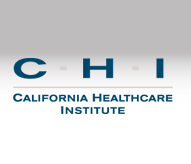CHI Congratulates Congressional Election Winners
by
Joan Trombetti, Writer | November 10, 2008

California Healthcare
Institute (CHI)
CHI congratulated members of the state's congressional delegation for their election victories and committed to work as partners to improve healthcare, promote medical innovation, and strengthen our economy.
California is the worldwide leader in biomedical R&D, with more than 2,700 biomedical companies and research institutions advancing scientific knowledge and developing new tools, technologies and treatments for serious ailments such as cancer, diabetes, and HIV/AIDS, chronic pain, and cardiovascular, respiratory and infectious diseases. California's life sciences industry is also an important engine of economic growth, employing some 270,000 workers statewide, and leading the nation in terms of both venture capital investment ($3.2 billion) and National Institutes of Health (NIH) research funding ($3.16 billion).
Concerns facing the industry, though, include:
Science funding -- After doubling the NIH budget between 1998 and 2003, federal support for biomedical research has weakened. In fact, current funding has fallen below the rate of inflation, resulting in a net decrease. The consequences are less research and fewer researchers pursuing the next generation of medical breakthroughs. Advances in basic research into the biology of disease enable the biomedical industry to apply new discoveries to the development of new medical therapies. At a time when U.S. leadership in global innovation faces serious threats, Congress must reverse this slide and provide more funding for basic biomedical research, including stem cell science.
Patent Rights -- Attracting investment into companies developing the next generation of medicines and technologies depends on a strong, reliable patent system. Thus, protection of patent rights is a top priority for California's biomedical industry leaders, small life sciences companies that rely on venture capital, and research universities. Proposals to undermine patent quality and certainty, such as through mandatory apportionment of damages, open-ended post-grant challenges, or failure to address inequitable conduct, would hinder biomedical research and innovation in California by reducing incentives for investment in R&D and drying up venture capital.
Biosimilars -- While focused on the development of the next generation of innovative medicines, we understand that the increasing cost of health care is a growing burden for private-sector and government budgets. In the long term, follow-on biologics may offer savings within the U.S. healthcare system. Considering the complexity of biotech development and manufacturing, it is possible for the FDA to develop a successful, science-based approval pathway for biosimilars. This pathway must include high safety and efficacy standards along with incentives necessary to encourage future biotechnology investment and innovation.
